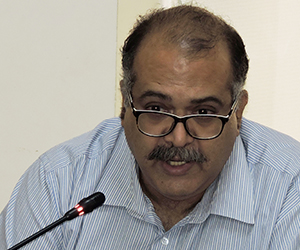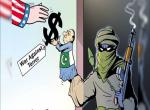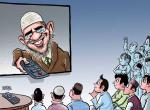Want to earn an easy $ 10 million? Just log on to the Rewards for Justice website of the US State Department, type in the submit a tip space on the website ‘116E, Johar Town, Lahore’ ...
– the address of India’s and now also one of America’s most wanted terrorists, Hafiz Saeed, Chief of the international Islamist terror organisation, Jamaatud Dawa/Lashkar-e-Taiba – and Voila, you will be eligible for winning the Rs. 50 Crore bounty announced by the Americans for giving information leading to the arrest of the notorious terror boss. You could also inform the Americans that Saeed was strutting about openly, spreading his hate-filled venom in a public meeting organised by the ISI-sponsored Difa-e-Pakistan Council last Sunday at Jinnah Park, Sialkot, and on April 15 he is scheduled to address another such rally in Peshawar. Alas, easy money is not so easy to come by especially from the Americans who don’t believe in giving free lunches or money to anyone, except for the Pakistanis.
Quite frankly, the Americans have more dope on Saeed and others of his ilk than all of us put together and if they really wanted they could have fixed the hash of Saeed and his sponsors and supporters long time ago. They really didn’t need to announce a bounty on him because normally bounties are announced for people whose whereabouts are not known. But Hafiz Saeed and Abdul Rehman Makki are not in hiding. They operate in full public view, celebrated and feted by the Pakistani establishment, living under the ISI’s protection and patronage. What is more, placing Saeed and Makki on the most wanted list appears to have been done rather hastily, something that is apparent from the big blooper labelling the JuD a ‘radical Deobandi terrorist organisation’ when it is actually a Ahle Hadith (Wahabbi) outfit.
Clearly, putting Saeed and Makki on the most wanted list of terrorists has less to do with the US-led War on Terror or giving a favour to India; it has more to do with the downturn in the US-Pakistan relations and is a signal, even warning, to the Pakistanis to restore their relations with the US or else be prepared for some sort of US retaliation. It is also possible that this could be the start of preparing the ground for declaring Pakistan a terrorist state at some time in the not too distant a future. The reason Saeed has been picked is not very complicated. Apart from the fact that the LeT is a terror organisation with an international footprint, Saeed’s closeness to the Pakistani establishment – he is virtually an auxiliary of the ISI – makes him a perfect target for pressing home the point with the Pakistanis. Add to this Saeed’s murderous campaigns against India (not only in the Indian state of Jammu and Kashmir but also in other parts of the country) and he becomes an even more tempting target to deliver a message to the Pakistanis: either you give us what we want, or else we will use the India card against you. This is something that invariably helps to concentrate the Pakistani mind to the demands of the US.
Saeed’s case is of course not the first time that the Americans have used the India card to get something out of the Pakistanis. Just a few months back, when US-Pakistan relations had taken a big dip after the Osama bin Laden raid by US Special Forces, the Americans made an example of the ISI agent Ghulam Nabi Fai to inform the Pakistanis of the damage that can be caused to their pet obsessions like Kashmir. For nearly two decades Fai had been operating on ISI instructions and with ISI money to carry out his poisonous propaganda against India. But Fai’s anti-India activities were always either ignored or condoned. It was not until US-Pakistan relations went into a tailspin that the Americans decided to make an example of Fai and send a strong message to Pakistan by dismantling its entire propaganda machinery in the US.
Although the Indian establishment is exulting over the latest US move on Hafiz Saeed, it would do well to put any celebration on hold. India is really a beneficiary by default and not necessarily by design. If anything, other than the satisfaction of seeing a US bounty on Saeed and Makki, India shouldn’t expect anything much at this stage, certainly not any concrete action against either of these two terrorist chieftains. Just a couple of years back, the Kerry-Lugar-Berman law under which Pakistan was to receive $ 7.5 billion aid had required the US Secretary of State to certify that the Pakistanis were acting against terror groups like the JuD/LeT. Until now, the US Secretary of State isn’t known to have withheld this certification in spite of the fact that during this entire period, the JuD activities have only increased as indeed has its public profile.
In all likelihood, therefore, the US will desist from taking any precipitate action against Saeed despite having placed him on the most wanted list. As far as the US is concerned, it is trying to ratchet up the pressure on the Pakistanis at this point in time and if the Pakistanis play ball, no further action will be taken on the Saeed front. But if the Pakistanis continue to hold out and make utterly over the top demands to restore the US and NATO supply lines, there is every chance that the Americans might stop their kid-glove approach towards Pakistan on the issue of terrorism.
The problem however is that if the Americans now soft-peddle the issue of Saeed (in the fond hope of the Pakistanis delivering what is asked of them), they will only end up devaluing the seriousness with which their most wanted list is seen around the world in general, and by Pakistan in particular. In a sense, the US list will be treated the same way as the Indian list of 20, sometimes 30 and at other times even 50, wanted terrorists that is dusted and handed over to the Pakistanis every time a major terrorist attack takes place in India, only to see the Pakistanis throw the list in the rubbish bin.
Come to think of it, why should the Pakistanis take the Indian most wanted list seriously when even the Indian government doesn’t, something that is apparent from the perfunctory manner in which this list is treated by India. What is worse, notwithstanding the welcome being accorded to the US decision on listing Saeed on its most wanted list, one really wonders if this move isn’t a cause of discomfiture for the Indian Prime Minister and his advisors who have all but forgotten the terrorist outrage of 26/11 and the uncountable other similar incidents only so they can once again chase the chimera of normalising relations with Pakistan, a country that is far from normal and still remains implacably inimical to India.
Author is Senior Fellow in Vivekananda International Foundation
Published Date : 5th April, 2012










Post new comment